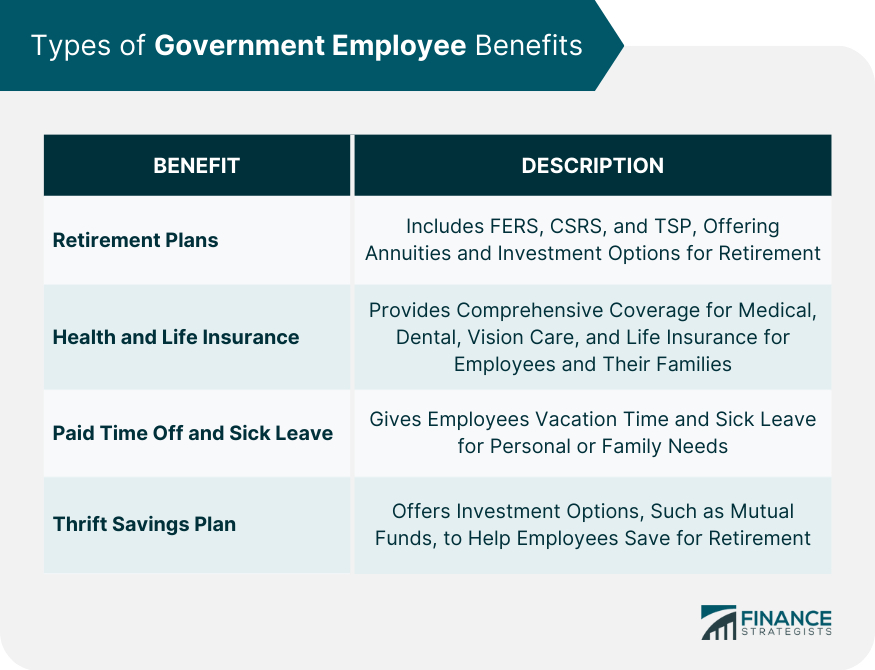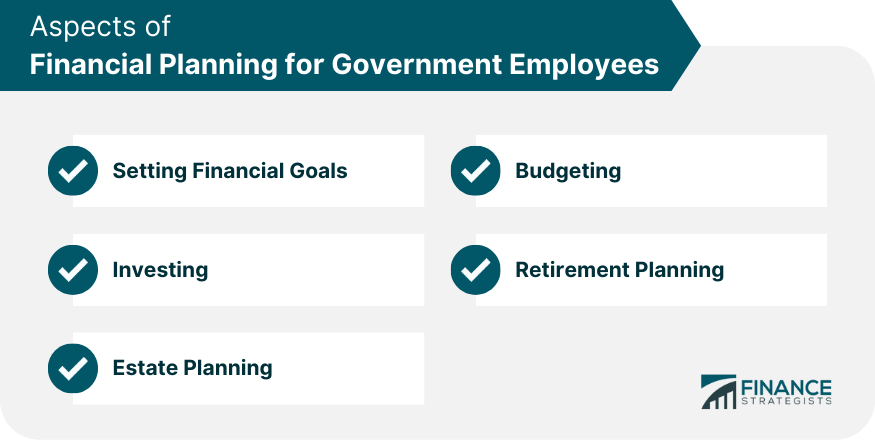Financial planning for government employees is the process of creating a roadmap for their financial future while working for the government. It involves setting financial goals, analyzing income and expenses, understanding government employee benefits, and developing strategies to achieve those goals. Financial planning can help government employees make informed decisions about their finances, maximize their benefits, and plan for retirement. It may include creating a budget, investing in stocks, bonds, and real estate, managing debt, and planning for estate and tax considerations. A comprehensive financial plan can help government employees feel more confident and in control of their financial future. Government employees, like any other individuals, need financial planning to ensure their long-term financial security. Financial planning can help employees make informed decisions about managing their income, benefits, and investments, and create a roadmap for achieving their financial goals. Government employees are eligible for retirement plans, including the Federal Employee Retirement System (FERS), the Civil Service Retirement System (CSRS), and the Thrift Savings Plan (TSP). These plans offer various benefits, including annuities and investment options. Government employees are also eligible for health and life insurance benefits. These benefits offer comprehensive coverage for medical, dental, and vision care, as well as life insurance coverage for employees and their families. Government employees receive paid time off, including vacation time and sick leave, to use for personal or family needs. These benefits provide employees with the flexibility to take time off without sacrificing their income or job security. The Thrift Savings Plan is a retirement savings plan that is available to government employees. This plan offers investment options, including a variety of mutual funds, to help employees save for retirement. Short-term goals for financial planning for government employees may include creating an emergency fund, paying off high-interest debt, or saving for a down payment on a home. These goals can help employees build a solid financial foundation. Mid-term goals for financial planning for government employees may include saving for education expenses, purchasing a home, or starting a business. These goals require a longer-term approach and may involve larger amounts of savings. Long-term goals for financial planning for government employees may include retirement savings, estate planning, and charitable giving. These goals require a comprehensive strategy that takes into account an employee's overall financial situation and objectives. The first step in budgeting for government employees is to track expenses. Tracking expenses means recording all income and expenses over a given period, such as a month or a year. This helps government employees understand their spending habits and identify areas where they can cut back. There are various tools and apps available that can help track expenses, such as Mint or YNAB. Once expenses are tracked, a budget can be created. A budget should include all income and expenses, with a goal of allocating funds to achieve financial goals. It is essential to ensure that the budget is realistic and takes into account unexpected expenses that may arise. The budget should also allow for saving and investing for the future. Sticking to a budget can be challenging, but there are various strategies that government employees can use. Automating bill payments can help ensure that bills are paid on time and avoid late fees. Reducing discretionary spending, such as eating out less or canceling subscriptions, can also help save money. Finding ways to increase income, such as taking on a part-time job or selling unwanted items, can help increase the amount of money available for saving and investing. It is essential to review the budget regularly and make adjustments as needed to ensure that financial goals are being met. Government employees may choose to invest in stocks to build wealth over the long term. Stocks offer the potential for higher returns than other investment options but also carry higher risk. Government employees can invest in individual stocks or buy shares in mutual funds or exchange-traded funds (ETFs) that invest in stocks. It is essential to research companies and diversify investments to minimize risk. Bonds are another investment option for government employees. Bonds are fixed-income securities that provide a steady stream of income but offer lower returns than stocks. Government employees can invest in individual bonds or buy shares in bond mutual funds or ETFs. It is important to research the creditworthiness of the issuer and diversify investments to minimize risk. Mutual funds are a popular investment option for government employees. These funds offer diversification and professional management of investments. Mutual funds pool money from multiple investors and invest in a variety of assets, such as stocks, bonds, and real estate. Government employees can choose from various types of mutual funds, such as index funds, actively managed funds, and target-date funds. It is essential to research fees and performance and diversify investments to minimize risk. Real estate can be an investment option for government employees. Real estate can provide rental income and may appreciate over time. Government employees can invest in rental properties or buy shares in real estate investment trusts (REITs). It is important to research the location and condition of the property and diversify investments to minimize risk. Additionally, being a landlord requires a certain level of involvement and may not be suitable for all investors. Retirement benefits for government employees include annuities, pension plans, and the Thrift Savings Plan. These benefits provide a retirement income stream and investment options to help government employees save for retirement. To maximize retirement benefits, government employees can use various strategies, such as contributing to the Thrift Savings Plan, taking advantage of employer matches, and creating a diversified investment portfolio. Government employees can also maximize their retirement benefits by choosing the right time to retire, understanding their eligibility for retirement benefits, and creating a comprehensive retirement plan. Estate planning for government employees involves creating a will or trust to ensure that their assets are distributed according to their wishes. These documents can also provide for family members and protect against estate taxes. Beneficiary designations are another aspect of estate planning for government employees. These designations ensure that retirement benefits and other assets are distributed according to an employee's wishes. Estate tax planning is also important for government employees. This involves understanding estate tax laws and finding ways to minimize estate taxes through estate planning strategies. Financial planning is crucial for government employees to ensure their long-term financial security. It involves setting financial goals, analyzing income and expenses, understanding government employee benefits, and developing strategies to achieve those goals. Government employees are eligible for retirement plans, health and life insurance benefits, paid time off, and the Thrift Savings Plan, among others. Budgeting and investing strategies can help employees make the most of their income and achieve their financial goals. Retirement planning is also crucial for government employees, and estate planning can protect their assets and ensure their wishes are carried out. By creating a comprehensive financial plan, government employees can feel more confident and in control of their financial future.Definition of Financial Planning for Government Employees
Types of Government Employee Benefits
Retirement Plans
Health and Life Insurance
Paid Time Off and Sick Leave
Thrift Savings Plan

Setting Financial Goals for Government Employees
Short-Term Goals for Financial Planning for Government Employees
Mid-Term Goals for Financial Planning for Government Employees
Long-Term Goals for Financial Planning for Government Employees
Budgeting for Government Employees
Tracking Expenses
Creating a Budget
Strategies to Stick to a Budget
Investing for Government Employees
Stocks
Bonds
Mutual Funds
Real Estate
Retirement Planning for Government Employees
Retirement Benefits for Government Employees
Retirement Savings Strategies
Maximizing Retirement Benefits
Estate Planning for Government Employees
Wills and Trusts
Beneficiary Designations
Estate Tax Planning

Conclusion
Financial Planning for Government Employees FAQs
Financial planning for government employees is the process of setting financial goals and developing strategies to achieve those goals while working for the government.
Financial planning is important for government employees to help them manage their finances, maximize their benefits, and plan for retirement.
Government employees receive benefits such as retirement plans, health and life insurance, paid time off, sick leave, and Thrift Savings Plan.
Strategies for budgeting as a government employee include tracking expenses, creating a budget, and finding ways to stick to the budget, such as reducing discretionary spending.
Government employees can invest in stocks, bonds, mutual funds, and real estate to grow their wealth over time. It is important to research and diversify investments to minimize risk.
True Tamplin is a published author, public speaker, CEO of UpDigital, and founder of Finance Strategists.
True is a Certified Educator in Personal Finance (CEPF®), author of The Handy Financial Ratios Guide, a member of the Society for Advancing Business Editing and Writing, contributes to his financial education site, Finance Strategists, and has spoken to various financial communities such as the CFA Institute, as well as university students like his Alma mater, Biola University, where he received a bachelor of science in business and data analytics.
To learn more about True, visit his personal website or view his author profiles on Amazon, Nasdaq and Forbes.











